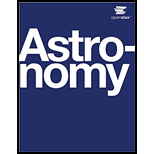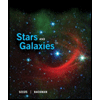
Concept explainers
Compare the following stages in the lives of a human being and a star: prenatal, birth, adolescence/ adulthood, middle age, old age, and death. What does a star with the mass of our Sun do in each of these stages?
To describe:
The different phasesin the life of a star and compare it with the lives of a human being.
Explanation of Solution
Introduction:
The prenatal period is the development period of the child inside the mother’s womb, where the child is dependent on the mother for food supply.
On the birth of a child, it is capable to produce its own energy from the food that it eats. Later it passes through different phases in its life through adulthood, middle-age, old-age and then dies.
In the prenatal stage, the core of the giant’s molecular clouds collapses due to gravity and becomes a protostar. On protostar’s disk material is continuously falling.
Once a star has reached the main-sequence band in the H-R diagram. The term zero-age is used to name the time whenthe star stops contracting, and it obtains the energy almost entirely from the nuclear fusion reaction (fusion of hydrogen molecule into helium molecule).Scientists say that this is the birth of a star.
When the surface temperature of star increases, the star “moves” to the left in the H-R diagram.As their luminosity, and temperature changes, the point on the H-R diagram also change. All-stars spend most of their lives on the main sequence of the H-R diagram, astronomers like to call this phase as adulthood.
When the star consumesthe entire core’s hydrogen, gravity takes over the pressure and the star startsto contract. Heat released during contraction begins the nuclear reaction in star shell’s hydrogen.The star moves upward from the main sequence in the H-R diagram and becomesa red giant. This phase of the star is the middle age.
After the consumption of the shell’s hydrogen, helium flash occurs which maintains the balance between pressure and gravity. Sooner or later, each star exhausts its store of nuclear energy and dies. A star like sun, dies as a white dwarf unlike massive stars which die as a neutron star or a blackhole.
Want to see more full solutions like this?
Chapter 22 Solutions
Astronomy
Additional Science Textbook Solutions
Essential University Physics: Volume 1 (3rd Edition)
College Physics: A Strategic Approach (3rd Edition)
College Physics: A Strategic Approach (4th Edition)
Tutorials in Introductory Physics
College Physics (10th Edition)
University Physics with Modern Physics (14th Edition)
- The lowest mass for a true star is 1/12 the mass of the Sun. What is the luminosity of such a star based upon the mass-luminosity relationship?arrow_forwardLook elsewhere in this book for necessary data, and indicate what the final stage of evolution-white dwarf, neutron star, or black hole-will be for each of these kinds of stars. A. Spectral type-O main-sequence star B. Spectral type-B main-sequence star C. Spectral type-A main-sequence star D. Spectral type-G main-sequence star E. Spectral type-M main-sequence stararrow_forwardWhat is the first event that happens to a star with roughly the mass of our Sun that exhausts the hydrogen in its core and stops the generation of energy by the nuclear fusion of hydrogen to helium? Describe the sequence of events that the star undergoes.arrow_forward
- Is the Sun an average star? Why or why not?arrow_forwardDo the previous problem again, this time using the information that the Sun is 150,000,000 km away. You will get a very large number of km as your answer. To get a better feeling for how the distances compare, try calculating the time it takes light at a speed of 299,338 km/s to travel from the Sun to Earth and from Alpha Centauri to Earth. For Alpha Centauri, figure out how long the trip will take in years as well as in seconds.arrow_forwardWhich of the following can you determine about a star without knowing its distance, and which can you not determine: radial velocity, temperature, apparent brightness, or luminosity? Explain.arrow_forward
- Why is it that we can describe the life cycle of a star and be confident about it?arrow_forwardWhite Dwarf Size II. The white dwarf, Sirius B, contains 0.98 solar mass, and its density is about 2 x 106 g/cm?. Find the radius of the white dwarf in km to three significant digits. (Hint: Density = mass/volume, and the volume of a 4 sphere is Tr.) 3 km Compare your answer with the radii of the planets listed in the Table A-10. Which planet is this white dwarf is closely equal to in size? I Table A-10 I Properties of the Planets ORBITAL PROPERTIES Semimajor Axis (a) Orbital Period (P) Average Orbital Velocity (km/s) Orbital Inclination Planet (AU) (106 km) (v) (days) Eccentricity to Ecliptic Mercury 0.387 57.9 0.241 88.0 47.9 0.206 7.0° Venus 0.723 108 0.615 224.7 35.0 0.007 3.4° Earth 1.00 150 1.00 365.3 29.8 0.017 Mars 1.52 228 1.88 687.0 24.1 0.093 1.8° Jupiter 5.20 779 11.9 4332 13.1 0.049 1.30 Saturn 9.58 1433 29.5 10,759 9.7 0.056 2.5° 30,799 60,190 Uranus 19.23 2877 84.3 6.8 0.044 0.8° Neptune * By definition. 30.10 4503 164.8 5.4 0.011 1.8° PHYSICAL PROPERTIES (Earth = e)…arrow_forwardFor a main sequence star with luminosity L, how many kilograms of hydrogen is being converted into helium per second? Use the formula that you derive to estimate the mass of hydrogen atoms that are converted into helium in the interior of the sun (LSun = 3.9 x 1026 W). (Note: the mass of a hydrogen atom is 1 mproton and the mass of a helium atom is 3.97 mproton. You need four hydrogen nuclei to form one helium nucleus.)arrow_forward
- The brightness of a "young" star sometimes increases and decreases as a result of regional areas of "hot" and "cold" on the star's surface as well as variations in the density of the star's planet-forming debris, which can obstruct light. Suppose that for a particular star, the average magnitude (measure of brightness) is 4.3 with a variation of ±0.31 (on the magnitude scale, brighter objects have a smaller magnitude than dimmer objects). Furthermore, the magnitude of a star is initially observed to be 4.61, and the time between minimum brightness and maximum brightness is 6.4 days. Write a simple harmonic motion model to describe the magnitude Mof the star for day t.arrow_forwardIn a binary star system, two stars orbit about their common centre of mass, as shown in figure. If 12 = 2r1, what is the ratio of the masses m2/m, of the two stars? CM m2 2arrow_forwardTime From this light curve, we can deduce that... O the star has a high mass exoplanet orbiting it O the star has an exoplanet orbiting it that has an eccentric orbit O the star has an exoplanet orbiting it that has an eccentric orbit O the star has an exoplanet that is not on the same orbital plane as the star L Brightnessarrow_forward
 AstronomyPhysicsISBN:9781938168284Author:Andrew Fraknoi; David Morrison; Sidney C. WolffPublisher:OpenStax
AstronomyPhysicsISBN:9781938168284Author:Andrew Fraknoi; David Morrison; Sidney C. WolffPublisher:OpenStax Foundations of Astronomy (MindTap Course List)PhysicsISBN:9781337399920Author:Michael A. Seeds, Dana BackmanPublisher:Cengage Learning
Foundations of Astronomy (MindTap Course List)PhysicsISBN:9781337399920Author:Michael A. Seeds, Dana BackmanPublisher:Cengage Learning Stars and Galaxies (MindTap Course List)PhysicsISBN:9781337399944Author:Michael A. SeedsPublisher:Cengage Learning
Stars and Galaxies (MindTap Course List)PhysicsISBN:9781337399944Author:Michael A. SeedsPublisher:Cengage Learning Stars and GalaxiesPhysicsISBN:9781305120785Author:Michael A. Seeds, Dana BackmanPublisher:Cengage Learning
Stars and GalaxiesPhysicsISBN:9781305120785Author:Michael A. Seeds, Dana BackmanPublisher:Cengage Learning An Introduction to Physical SciencePhysicsISBN:9781305079137Author:James Shipman, Jerry D. Wilson, Charles A. Higgins, Omar TorresPublisher:Cengage Learning
An Introduction to Physical SciencePhysicsISBN:9781305079137Author:James Shipman, Jerry D. Wilson, Charles A. Higgins, Omar TorresPublisher:Cengage Learning




